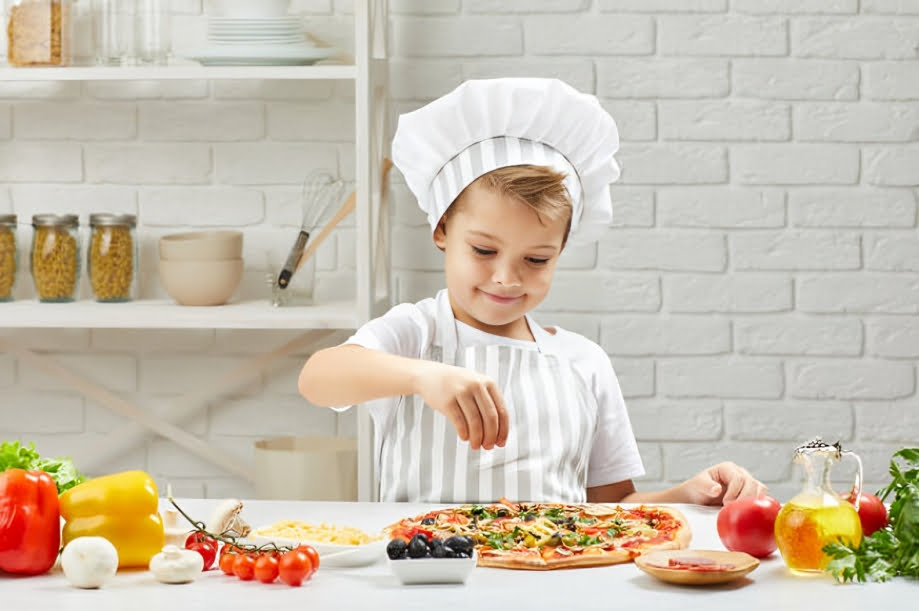Engage children in mindful cooking experiences to create lasting memories and healthy habits. Explore the benefits of involving kids in the kitchen and nurturing their relationship with food.
Table of Contents
Mindful Cooking: Engaging Kids in the Kitchen with Fun and Focus
The kitchen can be more than just a place to prepare meals; it can be a haven for connection, creativity, and, yes, mindfulness. By engaging your kids in mindful cooking, you’re not just teaching them valuable life skills, you’re also nurturing their senses, fostering a sense of accomplishment, and strengthening family bonds.
What is Mindful Cooking?
Mindful cooking is about bringing awareness to the present moment throughout the cooking process. It’s about paying attention to the sights, smells, textures, and sounds of the ingredients, the feel of chopping vegetables, the rhythmic stirring of a pot, and the anticipation of a delicious meal coming together.
Benefits of Mindful Cooking with Kids
The benefits of involving kids in the kitchen and nurturing their relationship with food are numerous and extend far beyond just learning how to cook. Here are some key areas where it can make a positive impact:
Health and Diet:
- Promotes healthier eating habits: Kids who are involved in preparing food are more likely to try new foods, especially fruits and vegetables, and develop a preference for healthier options. This is because they have a deeper understanding and appreciation for the ingredients and the effort involved in making a meal.
- Increases awareness of portion sizes: Cooking at home often involves using fresh ingredients and preparing smaller portions than restaurant meals, which can help kids develop healthy portion control habits.
- Reduces reliance on processed foods: When kids see how delicious meals can be made from scratch, they’re less likely to crave processed foods with high levels of sugar and unhealthy fats.
- Boosts understanding of nutrition: Learning about the different colors, textures, and nutrients in various foods can equip kids with valuable knowledge about making healthy choices later in life.
Life Skills and Development:
- Develops essential life skills: Cooking teaches kids valuable skills like measuring, chopping, following instructions, using kitchen tools safely, and problem-solving. These skills are not only useful in the kitchen but also extend to other areas of life.
- Improves fine motor skills and coordination: Chopping vegetables, stirring ingredients, and pouring liquids all require fine motor skills and hand-eye coordination, which benefit overall development.
- Boosts self-confidence and independence: Learning to cook helps kids feel capable and proud of their accomplishments, contributing to increased self-confidence and a sense of independence.
- Encourages creativity and experimentation: Cooking can be a creative outlet for kids, allowing them to experiment with flavors, textures, and presentation. This fosters creativity and problem-solving skills.
Family and Social Growth:
- Strengthens family bonds: Cooking together provides a shared experience that can strengthen family bonds and create lasting memories. It fosters teamwork, communication, and cooperation.
- Improves communication skills: Discussing recipes, planning meals, and sharing stories while cooking all contribute to better communication skills and family conversations.
- Cultivates a positive relationship with food: Involving kids in the process of choosing, preparing, and enjoying food helps them develop a positive and mindful relationship with it, appreciating its value and reducing picky eating or food anxiety.
Engaging Kids in the Kitchen: Age-Appropriate Activities
- Toddlers (1-3 years old): Let them help wash fruits and vegetables, stir ingredients, and sprinkle toppings.
- Preschoolers (4-5 years old): They can tear herbs, measure ingredients, and mix dry ingredients.
- Kindergarteners (6-7 years old): Give them tasks like peeling carrots, spreading butter on bread, and stirring sauces.
- School-aged children (8-12 years old): They can help chop vegetables, prepare simple dishes, and even use knives (with supervision).
- Teens (13+): They can take on more complex tasks like planning meals, experimenting with recipes, and even cooking independently.
Mindful Cooking Tips for All Ages:
- Start with simple recipes: Choose recipes with few ingredients and easy-to-follow instructions.
- Focus on the senses: Encourage kids to touch, smell, and taste the ingredients before cooking.
- Make it fun and playful: Sing songs, tell stories, and create silly names for dishes.
- Embrace mistakes: Don’t worry about perfection; let kids learn from their mistakes and have fun in the process.
- Set a mindful example: Practice mindfulness yourself in the kitchen and show your kids how to be present in the moment.
- Celebrate successes: Share the meal together and appreciate all the hard work that went into making it.
Make mealtimes mindful too!
- Turn off distractions like TV and phones during meals.
- Encourage everyone to slow down and chew their food carefully.
- Talk about the flavors, textures, and smells of the food.
- Express gratitude for the meal and the people who prepared it.
By incorporating mindful cooking into your family routine, you’re creating a space for fun, learning, and connection. So turn on the oven, gather your little chefs, and get ready to whip up some mindful magic in the kitchen!
Remember: The most important ingredient in mindful cooking is love. When you cook with love and mindfulness, you’re not just nourishing your body, you’re nourishing your soul and the souls of those around you.
Overall, involving kids in the kitchen and nurturing their relationship with food is an investment in their health, well-being, and development. It equips them with valuable life skills, fosters positive family connections, and promotes a healthy and mindful approach to food that benefits them throughout their lives.
So, put on your aprons, roll up your sleeves, and get ready to create some kitchen magic with your little ones! You might be surprised at the delicious meals and lasting memories you create together.






